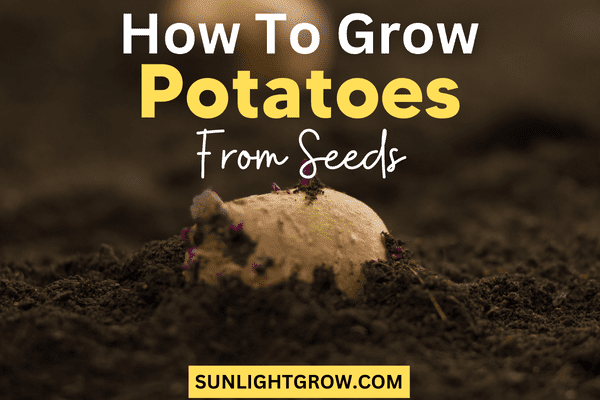
Learning how to grow potatoes from sprouts will help you harvest your own batch from home!
Whether used as a side dish or the foundation of a main meal, potatoes are a household staple for their stomach-filling starchiness.
In this post, I’m going to show you how to grow potatoes so that you can make French fries on demand!
How To Grow Potatoes From Sprouts
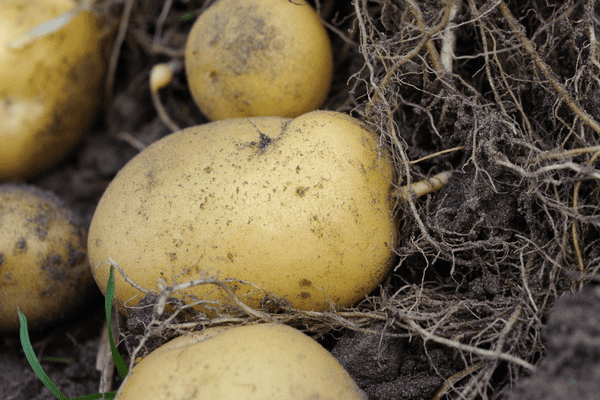
How To Pick The Right Potato Seeds
You should pick potato seeds that are disease-free and have lots of sprouts.
The sprouted potato seeds should have firm, smooth tubers and show lots of eyes. This will make planting easier.
How To Plant Sprouted Potatoes In Containers
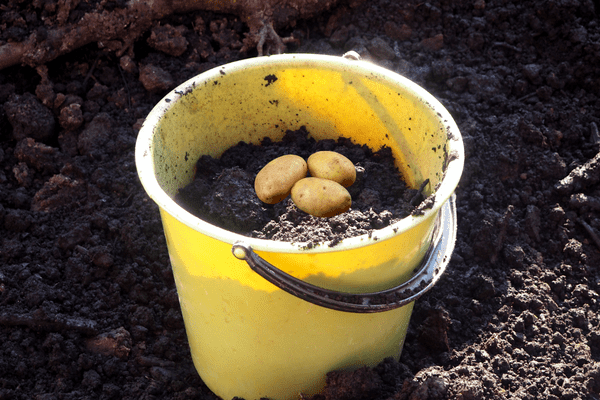
Growing potatoes in containers is a great way to start practicing your routine.
If you don’t have a lot of outdoor growing space, using a container with good drainage will do.
Fill Container
The first step is to fill a large container or bucket with organic potting soil.
Read our post on the best type of soil for growing vegetables here.
You’ll want to leave at least 2 inches of space at the top of the container.
Plant Your Potato Sprout
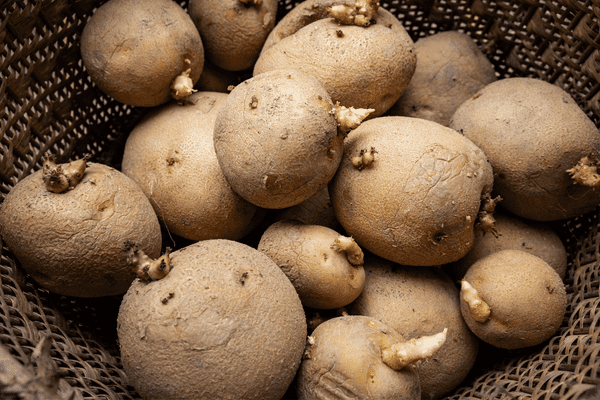
Next, grab your sprouted potato seed and place it on top of the soil.
Cover the potatoes with 2-3 inches of soil with the sprouts facing upward.
Water the soil well and add additional soil onto the sprout until plant is 6 inches tall.
Harvest
Once the top of the vines start to die, you know the potatoes are ready for harvest.
Carefully dig through the soil to harvest your potatoes.
How To Plant Sprouted Potatoes In Garden
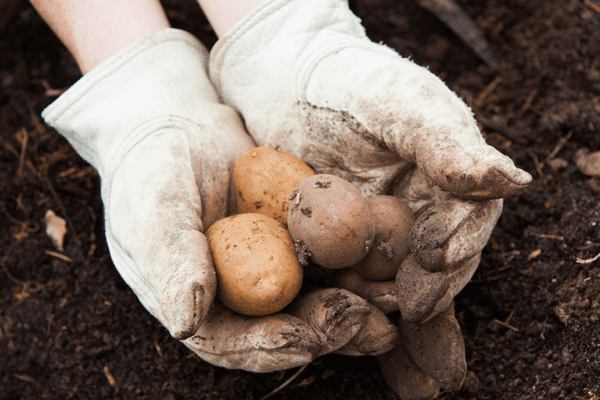
If you have space in your garden of a potato plant, you can directly sow your sprout outside.
To plant potato sprouts, you will need:
- Potato sprouts (also called seed potatoes)
- A trowel or digging fork
- Compost or well-rotted manure (optional)
- Mulch (optional)
1. Choose A Sunny Spot
You’ll want to plant your potato seed in an area with lots of sunlight.
2. Make Holes In Soil
Before planting, the soil should be well-drained.
Use a trowel or digging fork to make holes in soil that are 8 inches deep and 12 inches apart.
You can add compost or rotted manure to the bottom of the holes to promote growth.
3. Plant Potato Seeds
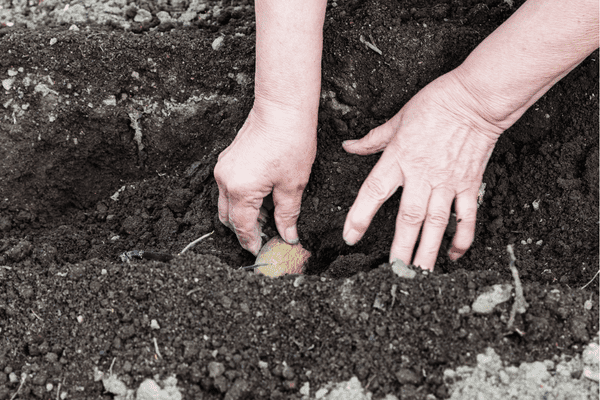
Place one seed potato in each hole, with the sprouts facing upwards.
Cover the seeds with soil and gently pat down.
Like the potted method, you should mound soil around the stem to prevent their tubes from being exposed.
4. Water Soil
Be sure to water the soil well and keep consistently moist until maturity.
You can add mulch or hay around the plant to help retain moisture.
5. Harvest
Once the plants have begun to wilt(have turned yellow), you can then harvest the potatoes!
How To Grow a Sprouted Potato In Water

Growing sprouted potatoes in water is a process known as “Potato Tuber Propagation”.
It’s similar to the container grow method but just with water
1. Fill Vase Or Jar
Pour water into a medium-sized vase or jar, leave 2-3 inches of space at top.
2. Place SpRout
Place the potato seed in water with the sprouts facing upward.
3. Move To Sunny Area

The potato seed needs lots of sunlight, so make sure it’s placed in a well-lit area.
4. Add More Water
To keep sprouts submerged, add more water to the container.
5. Transplant
Once the seed sprouts reach 3 inches in length, transplant them into soil using the previous methods.
Planting Sprouted Potatoes In A Bag
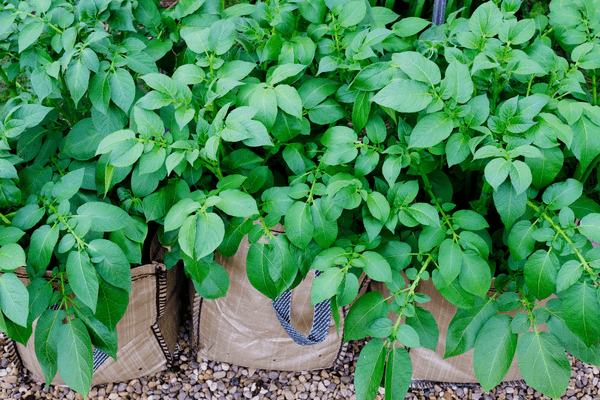
Optionally, you can grow potato seeds from bag.
It’s convenient to have a designated potato growing sack or trash bag to start your process.
You’ll start off this method by filling the bag halfway with soil. Throw in organic compost or manure for extra nutrition.
Next, place the seed on top of the soil mixture with sprouts facing up.
Cover the potato with 2-3 inches of soil, then fold the top bag down over it.
Leave a few inches of space at the top of the bag.
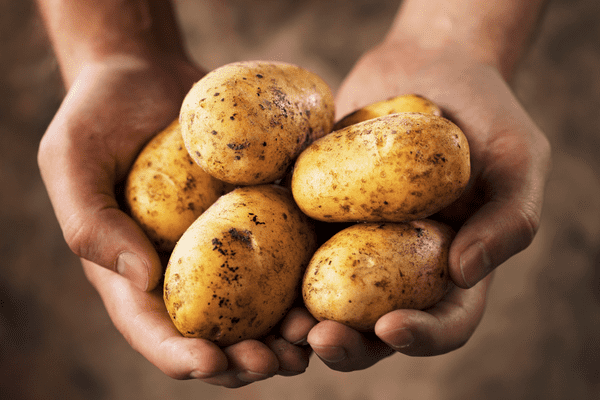
Water the soil well and “hill” soil around the tube until plant is 6 inches tall.
Harvest the potatoes once the plant dies back and turn yellow. Carefully open the bag and pick the potatoes that you want to use.
Now that you know how to grow potatoes, you can start harvesting at home.
Be sure to read our post on the 10 benefits of composting you’ll want to know about!
